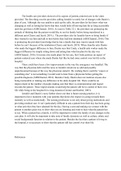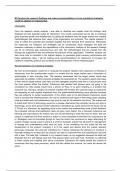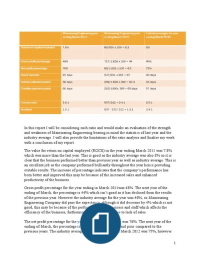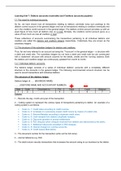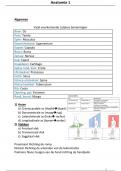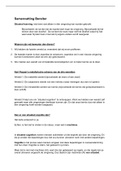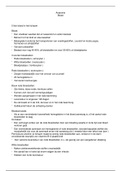Problem 7 – Move to improve
Part 1 - Movement effects on cognition
Tomporowski, P. D., Davis, C. L., Miller, P. H., & Naglieri, J. A. . (2008). Exercise and children’s
intelligence, cognition, and academic achievement. Educational Psychology Review, 20, 111–131.
doi:10.1007/s10648-007-9057-0
Purpose review: evaluate published studies that have examined the effects of physical activity and
exercise on children’s intellectual function, cognitive abilities, and academic achievement—indices of
children’s mental function.
1. An overview of contemporary cognitive theory directed toward exercise.
2. A description of cross-sectional and experimental studies conducted with children.
3. An examination of methodological issues and recommendations for future research.
The Executive Function Hypothesis
Cognition: a general term that reflects a number of underlying mental processes. Colcombe and
Kramer (2003): A causal link between fitness level and brain vitality, and the link is particularly strong
when the effects of exercise training are evaluated with cognitive tests of executive function.
Executive functions are involved in planning and selecting strategies that organize goal-
directed actions and stand apart from processes involved in basic information processing. Executive
functioning is not an unitary process; it is a number of more elemental underlying processes. 3
variables which are separable: set-shifting, requires individuals to disengage processing operations of
an irrelevant task and to engage operations involved in a relevant task; updating, closely linked to
working memory and the need to monitor mental representations; and inhibition, involves the
deliberate suppression of a prepotent response.
Research conducted with older adults supports the executive function hypothesis. Plausible
that the executive function hypothesis can be extended to predict exercise-related improvements in
children’s cognitive function.
Research Review
Intent review: examine closely the child exercise literature with a view toward better understanding
linkages between physical activity and specific types of cognitive functioning.
Review limited to published correlational and cross-sectional studies and randomized
experiments that evaluate the impact of chronic exercise or habitual physical activity on measures of
children’s mental function. Chronic exercise interventions: designed specifically to improve
participants’ physiological functioning via repeated training sessions that last several weeks or
months. No studies that assess the effects of individual or acute bouts of exercise on cognition.
Studies grouped on the basis of 3 outcome measures: intelligence, cognition, and academic
performance. Each of the measurement approaches used to assess the effects of exercise on
children’s mental function has strengths and weaknesses:
Exercise and children’s intelligence (IQ tests)
Researchers failed to detect the effects of exercise on children’s intelligence. Plausible explanation:
IQ tests provide only global measures of functioning, which may not be sensitive enough to detect
subtle changes in specific aspects of cognitive functioning brought about by exercise training.
Exercise may differentially benefit specific components of cognitive processing. The processes that
are central to executive function are difficult to isolate via traditional IQ tests.
Studies that measure specific components of cognition:
Exercise and children’s cognitive processes (Cognitive tests)
Cross-sectional studies: children who are physically fit perform cognitive tasks more rapidly and
display patterns of neurophysiological activity indicative of greater mobilization of brain resources
Part 1 - Movement effects on cognition
Tomporowski, P. D., Davis, C. L., Miller, P. H., & Naglieri, J. A. . (2008). Exercise and children’s
intelligence, cognition, and academic achievement. Educational Psychology Review, 20, 111–131.
doi:10.1007/s10648-007-9057-0
Purpose review: evaluate published studies that have examined the effects of physical activity and
exercise on children’s intellectual function, cognitive abilities, and academic achievement—indices of
children’s mental function.
1. An overview of contemporary cognitive theory directed toward exercise.
2. A description of cross-sectional and experimental studies conducted with children.
3. An examination of methodological issues and recommendations for future research.
The Executive Function Hypothesis
Cognition: a general term that reflects a number of underlying mental processes. Colcombe and
Kramer (2003): A causal link between fitness level and brain vitality, and the link is particularly strong
when the effects of exercise training are evaluated with cognitive tests of executive function.
Executive functions are involved in planning and selecting strategies that organize goal-
directed actions and stand apart from processes involved in basic information processing. Executive
functioning is not an unitary process; it is a number of more elemental underlying processes. 3
variables which are separable: set-shifting, requires individuals to disengage processing operations of
an irrelevant task and to engage operations involved in a relevant task; updating, closely linked to
working memory and the need to monitor mental representations; and inhibition, involves the
deliberate suppression of a prepotent response.
Research conducted with older adults supports the executive function hypothesis. Plausible
that the executive function hypothesis can be extended to predict exercise-related improvements in
children’s cognitive function.
Research Review
Intent review: examine closely the child exercise literature with a view toward better understanding
linkages between physical activity and specific types of cognitive functioning.
Review limited to published correlational and cross-sectional studies and randomized
experiments that evaluate the impact of chronic exercise or habitual physical activity on measures of
children’s mental function. Chronic exercise interventions: designed specifically to improve
participants’ physiological functioning via repeated training sessions that last several weeks or
months. No studies that assess the effects of individual or acute bouts of exercise on cognition.
Studies grouped on the basis of 3 outcome measures: intelligence, cognition, and academic
performance. Each of the measurement approaches used to assess the effects of exercise on
children’s mental function has strengths and weaknesses:
Exercise and children’s intelligence (IQ tests)
Researchers failed to detect the effects of exercise on children’s intelligence. Plausible explanation:
IQ tests provide only global measures of functioning, which may not be sensitive enough to detect
subtle changes in specific aspects of cognitive functioning brought about by exercise training.
Exercise may differentially benefit specific components of cognitive processing. The processes that
are central to executive function are difficult to isolate via traditional IQ tests.
Studies that measure specific components of cognition:
Exercise and children’s cognitive processes (Cognitive tests)
Cross-sectional studies: children who are physically fit perform cognitive tasks more rapidly and
display patterns of neurophysiological activity indicative of greater mobilization of brain resources

